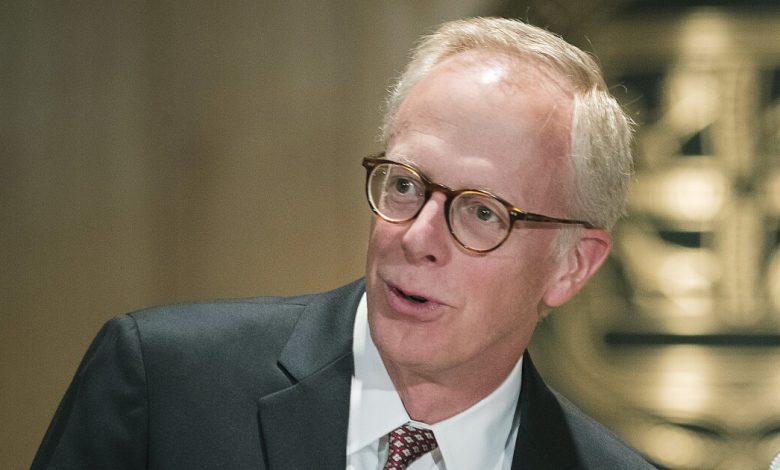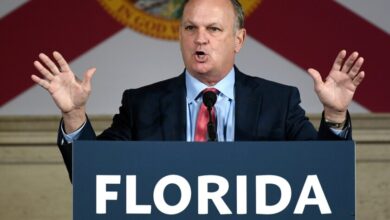‘Quid Pro Quo’? A Former U. of Minnesota Regent Is the Sole Finalist for a Campus’s Interim Chancellorship

A University of Minnesota regent who resigned his position in order to be considered for an interim chancellorship at one of the system’s campuses has now been recommended for the job. On Wednesday, the university’s Board of Regents will be asked to vote on their former colleague’s appointment.
The unusual candidacy of the former regent, David J. McMillan, has raised conflict-of-interest concerns and intensified months of simmering conflicts over the governance and leadership of the university system, and over the pay and contract of its president.
In response to a call for nominations on May 23, six people applied to be Duluth’s interim chancellor, according to a memo sent to the regents on behalf of the search committee. McMillan submitted his resignation letter a day before the deadline to apply for the Duluth position. The committee interviewed just one candidate, McMillan, noting he had “leadership qualifications, system-level experience, and passion for UMD and the Duluth community that exceeded the other applicants,” the memo, which was published on the regents’ website on Friday as part of the docket for Wednesday’s meeting, reads.
Critics, including former Gov. Arne H. Carlson of Minnesota, have in recent weeks expressed concern about McMillan’s candidacy. Carlson, a Republican, told KSTP that it marked “a serious conflict of interest.” That’s because McMillan, as a regent, voted in December to approve a contract extension and raise for the system’s president, Joan T.A. Gabel. (McMillan was also chair of the board when Gabel was hired.) To Carlson, the arrangement marked “a very shabby quid pro quo.”
Carlson, along with a retired state legislator, a law professor, and Darrin M. Rosha, a regent, made similar arguments in a June letter requesting a legislative audit of McMillan’s application and other board issues. (The auditor responded, in a letter shared with The Chronicle, that the subject would be added to a list of topics for the legislative audit commission to discuss in 2023.) The group also alleges that McMillan and Gabel spoke about his candidacy while McMillan was still a regent (McMillan denies the charge). McMillan “indicated that he had started ‘high level’ discussions” with Gabel about the job “before he decided he should resign and submit his nomination,” according to an email Rosha sent to Gabel, and which he shared with The Chronicle.
Gabel replied to Rosha noting that McMillan’s decision to resign as regent and apply for the interim chancellorship “comes with no assurances.” But Rosha told The Chronicle that Gabel did not respond to detailed follow-up questions he asked about the process.
McMillan emphatically denied any impropriety in an interview with The Chronicle, calling the idea of a quid pro quo between him and Gabel “preposterous.” He and Gabel had spoken only about visions for the Duluth campus and the system at large, he said, and he did not talk to her or anyone else about the interim chancellorship. “Never did I ever have any promise, any understanding, any conversation whatsoever about my chances as a member of the applicant pool,” McMillan said. “I gave up my seat on the board and didn’t look back, and it’s up to the Board of Regents now.”
In fact, McMillan said, he hadn’t even planned to apply for the job. Rather, others had asked him to consider it after Gabel issued a call for nominations. After a search for a permanent chancellor failed earlier this year, McMillan, a Duluth alumnus, saw an opportunity to help.
If the board votes him interim chancellor, McMillan said, he doesn’t think the controversy of recent weeks would affect his ability to do the job. He sees the hubbub as a one-man smear campaign waged by Rosha. “It’s very unfortunate that one individual has chosen to turn this into what he has, without a shred or a modicum of evidence,” McMillan said.
Gabel, for her part, recused herself from the search process, in an email she sent to the Duluth community on June 22. “While the president has the authority and discretion to appoint an interim chancellor,” she wrote, “I have charged the search committee to, solely at their direction, review the applications, interview candidates as needed, and ultimately recommend to the Board of Regents who the committee believes should serve as interim chancellor.”
The search committee co-chairs said that McMillan’s professional background as a former utility-company executive and his “significant understanding of higher-education challenges and opportunities,” specifically at Duluth and in the Minnesota system, gave them “utmost confidence that he is well-prepared and highly qualified to succeed in this position and to lead UMD forward.” The co-chairs of the search committee, who wrote the memo, did not immediately respond to a request for comment.
Rosha and others have raised concerns about McMillan’s lack of experience in academic administration. On Thursday, Rosha said in a statement to The Chronicle that “the recommendation lacks transparency and comes from two leaders who have benefitted by receiving substantial sums of money from Mr. McMillan’s actions as a regent.” (Those two leaders, Rosha said, are Gabel and Myron Frans, the system’s senior vice president for finance and operations and a co-chair of the Duluth search committee. As a regent, McMillan voted to approve raises for both.) “Such a maneuver,” Rosha continued, “has never occurred at the University of Minnesota in 171 years to my knowledge, and it would not reflect well on the integrity of the Board of Regents or the university.”
Frans did not respond to a request for comment, and a representative for Gabel offered only her recusal email.
‘Manufactured Inferences’
Rosha has in recent months clashed with board leadership. After he, Carlson, and others asked for a legislative audit of the circumstances surrounding McMillan’s candidacy, the board’s chair and vice president wrote Rosha to critique his “baseless and reckless assertions over the ongoing search for a chancellor at the University of Minnesota Duluth.” Rosha’s spreading of “manufactured inferences,” chair Kendall J. Powell and vice chair Steven A. Sviggum wrote, marked “an irresponsible misuse” of his position. Powell and Sviggum wrote that Rosha had bypassed existing board procedures for raising concerns.
The conflict stems in part from a dispute over a new contract for Gabel, which was approved in December, and effectively gives the authority to determine the president’s raise to the board chair, who determines the bonus amount after consulting with a three-member Presidential Performance Review committee. The bonus amount, the contract says, is “based upon metrics, goals, and objectives to be agreed upon annually between president and the chair of the board.” (The performance-review committee’s three members — Powell and Sviggum currently among them — are appointed by Powell, the chair.)
The December contract gave Gabel a $10,000 raise immediately, with a second raise bumping her salary to $706,000 by the start of the 2023 fiscal year on July 1. It also added an annual performance bonus and other perks that bring Gabel’s 2022 salary to about $1 million. The changes were designed to bring Gabel’s pay into line with leaders at peer institutions, Sviggum said at the December meeting.
Rosha, a Minnesota alumnus who has been on the board since 2015, argued that Gabel’s contract improperly consolidates power with Powell as the board chair. The agreement “leaves the chair impermissibly greater among equals, with a presidential incentive to focus primarily, if not exclusively, on meeting the chair’s expectations with little regard to the other regents,” Rosha wrote in a lengthy response he sent to Powell and Sviggum on Tuesday, which he provided to The Chronicle. In the December meeting, Rosha said that empowering the board chair to set the president’s bonus violated board policy, which, he said, “creates an even greater concentration of that relationship between the chair and the president, as the chair will have sole authority to dictate six figures of compensation on an annual basis. I don’t believe that’s transparent.” He proposed an amendment to the contract that would have given the full board the power to decide on the amount of the president’s annual bonus. It failed in an 8-3 vote after several regents, including McMillan, spoke against it.
An arrangement in which a full board isn’t given jurisdiction over salary decisions goes against best practice, said Alan N. Crist, director of the Association of Governing Boards’ compensation-evaluation service. A board may have a compensation committee, Crist said, which can make recommendations to the larger body. But the full board should be apprised of how the committee came to its recommendation and should have an opportunity to approve it.
“Especially in public institutions, you need to make sure that both internal and external audiences are very clear on the basis for these decisions, and that anybody who has any conflict of interest should recuse themselves from any consideration or voting on compensation,” Crist said. “You don’t want the appearance of there being anything inappropriate.”
One expert condemned McMillan’s decision to resign as regent and seek the chancellorship. Armand Alacbay, vice president for trustee and government affairs at the American Council of Trustees and Alumni, said in a statement last week that members of university governing boards’ primary responsibility is to the public, which “requires that a regent avoid even the appearance of a conflict of interest in carrying out his or her fiduciary obligations. To do otherwise undermines public trust in our nation’s institutions of higher education, which are vital to the long-term civic and economic health of this country.”
Source link






